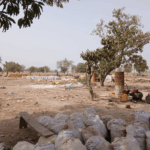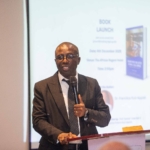
Lawyer and spokesperson for NPP flagbearer aspirant Kennedy Agyapong, Kwasi Kwarteng, says Ghana’s development is overly concentrated in Accra—a situation he believes has stifled growth in other parts of the country.
His comment follows Mr. Agyapong’s proposal to relocate some key ministries to other regions if elected president, as part of efforts to promote balanced national development.
Speaking on JoyNews’ AM Show on Monday, October 20, Mr. Kwarteng said the current development structure leaves most regional capitals underdeveloped and economically inactive.
“To be very honest, Ghana’s development is currently trapped in Accra, and if you go to most of the other regional capitals, they’re either underdeveloped or economically inactive,” he said.
“For instance, when you visit regional capitals like Wa, Bolgatanga, Damango, Techiman, and Koforidua, it’s almost like a ghost town or ghost cities. It’s almost silent—no economic activity going on during the day, literally—and there is little economic activity and few corporate jobs. Very often, you will realise that some of the commercial jobs are also not there,” he added.
Mr. Kwarteng explained that both he and Mr. Agyapong believe this concentration of economic activity in one city does not support inclusive growth.
“For me and Ken Agyapong, as a person, we are of the view that this is not how a country grows. Ken Agyapong is therefore proposing a bold reset to take government—and, of course, we all agree that we need a reset,” he stated.
He said the idea is to move governance closer to the people by decentralising ministries and key agencies to regions where their functions align with local strengths and resources.
“Instead of running Ghana from one overcrowded point, the city of Accra with high traffic, high rent, floods, and rising youth unemployment, while other towns remain undeveloped, Kennedy plans to relocate key ministries and agencies to some of these regions,” Mr. Kwarteng explained.
Citing examples, he said the Fisheries Ministry could be situated in the Central Region, while the Ministry of Food and Agriculture could be based in the northern regions where arable lands are available.
The Western Region, which hosts Ghana’s oil fields, could also house the Energy Ministry, he suggested.
“We are of the view that when ministries move, money, jobs, and decisions also move. And relocation creates a new ecosystem where you have contractors, hotels, schools, local industries, and this whole chain reaction for regional growth,” he emphasised.
Mr. Kwarteng insisted that the proposal goes beyond politics, describing it as an economic strategy aimed at spreading opportunities and alleviating poverty across all regions.
“What we are saying is not just about new offices; it’s about economics. It’s not the usual politics, but it’s about making every region also matter again,” he said.
He added that the initiative would also promote interregional trade, tourism, and investment—leading to a more balanced and inclusive economy.
“We are able to intertrade, boost tourism, and people will naturally move and travel from one region to another, invest in them, and ensure there is balanced development across all regions. Opportunity will spread, and we will be able to alleviate poverty and move our nation forward,” he added.



